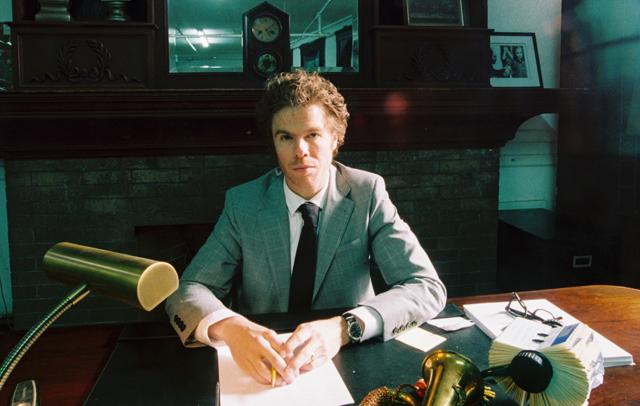In 2006, singer/songwriter/bandleader/all-around-nice-guy Josh Ritter was named in Paste’s "100 Greatest Living Songwriters," which was probably as daunting as it was flattering, since Ritter was, at the time, 29 years old. Dylan, Neil Young and Springsteen were numbers 1, 2 and 3 respectively; Ritter was number 97. But he still beat out T Bone Burnett, Jay Farrar and Outkast.
It's hard to quantify such a thing — what makes a good songwriter, anyway? Then you listen to, say, "Curtains" off Ritter's 2010 release, So Runs The World Away, and the soft, finger-style guitar and Ritter's lilting opening, and you're like, yeah. And then the biorhythmic boom of percussion and bass notes come in, and the oddly sweet sliver of imagery: "I was thirsty so I drank and though it was salt water there was something 'bout the way it tasted so familiar … "
And then there's the full orchestra of a band, part Americana and part symphonic, as if Ritter has transcended the folk tradition that nourished his burgeoning career from his Oberlin days, when he changed his major from neuroscience to "American History Through Narrative Folk Music."
"I really think that writing is like building a hallway," Ritter tells Xpress. "Songs are a mechanism and down this hallway are doors and doors on either side. If you build it right, people can walk down the hallway and walk through any of the doors they want. You build the doors, but who knows what's behind them for other people?"
The architecture of these songs relies heavily on archetypes — angels and ghosts, ships and trains, a mummy, a lark. "I like that certain symbols can stand for far more than just the word," says Ritter. "But that also means you relinquish control over how people interpret a song. Which I like, because I think it's enough to write the song. I never want people to tell me that their song has only one interpretation. I like to think that it can be open ended."
He makes that point on "Folk Bloodbath" in which he rewrites the deaths of folk heroes/antiheroes Louis Collins, Little Delia and Stackalee in a reinterpretation of the Mississippi John Hurt song, "Angels Laid Him Away." It's hard to perform a tune attributed to the likes of Hurt (who popularized the legend of Stackalee, a.k.a. Stagger Lee, as well) and Blind Willie McTell (who gave us "Little Delia") without sounding derivative, but Ritter patiently builds his sound with layers of voices and instruments (including a potent organ drone) and adds a goose-pimple-inducing and modern-making final verse: "And I'm looking over rooftops and I'm hoping that it ain't true, that the same God looks out for them looks out for me and you."
Angels are central to that song; they also appear in "Angels on Her Shoulders" (from Ritter's self-titled debut) and new rocker "Galahad." The musician says he only notices such recurrent appearances of "totemic images" after the fact. "They saturate our literature," he says. Which might explain why it's an angel and a horse, another of Ritter's totems, that feature in his forthcoming novel, Bright's Passage. (The book will be published by Random House in June.)
"This novel was originally a song," says Ritter. "I wasn't a song I really liked, but I loved the story so much, so I started writing it. For me, a well-written song is a story and it can be expanded hugely. By walking down that hallway, I'm going through the doors."
It's continuum that seems to intrigue him, be it in literature or music. He doesn't write love songs because "they aren't stories” but “more of a period at the end of a sentence." He continues, "I do like the idea that there can be a love song about crossing the street, but what happens when you get to the other side? No one knows, no one will ever find out. I like to know." To not restrict yourself, he says, you have to go farther into the song.
Which might be why Ritter seems to delight in the progression of his albums from recording studio to stage where each track takes on a life of its own. "You have learn where they fit in a set," he says. "The song that you think is not going to do anything ends up being your finale song. Those moments are awesome and it's great to experience them with a band because all of us create it. I love to see where the songs go and it's one of the most fun parts about performing."
Then again, Ritter seems to love every part of performing. To see him perform live is to watch a guy grinning from ear-to-ear, doing the thing he was born to do. Ritter calls the experience "almost Pavlovian — I'm smiling now just thinking about it," he says. "I don't know why it comes across the way it does, but it's very genuine. I feel pretty damned lucky."
— Alli Marshall can be reached at amarshall@mountainx.com.
who: Josh Ritter & The Royal City Band (with Scott Hutchison of Frightened Rabbit)
where: The Orange Peel
when: Tuesday, Feb. 15 (9 p.m., $15 advance, $17 doors. theorangepeel.net)




Before you comment
The comments section is here to provide a platform for civil dialogue on the issues we face together as a local community. Xpress is committed to offering this platform for all voices, but when the tone of the discussion gets nasty or strays off topic, we believe many people choose not to participate. Xpress editors are determined to moderate comments to ensure a constructive interchange is maintained. All comments judged not to be in keeping with the spirit of civil discourse will be removed and repeat violators will be banned. See here for our terms of service. Thank you for being part of this effort to promote respectful discussion.